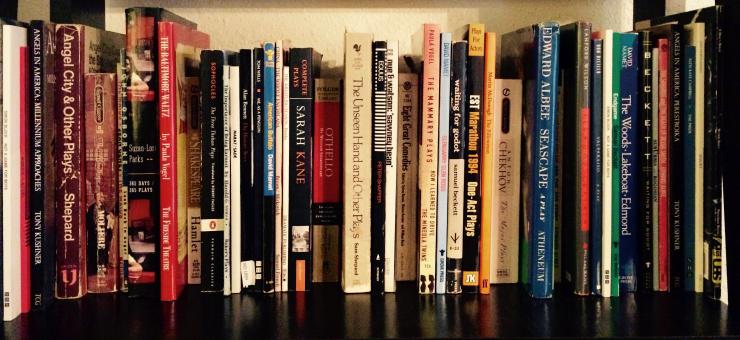Selling our Brand, Not our Shows
Recently I have been thinking a lot on the marketing aspects of theatre. Inspired by my own experiences working for big brand tech companies, and the recent post “Why Start a Theater Co-Op” by Robert Moskowitz—I have wondered if it isn’t time for us to reevaluate the business model of how we market and sell “theatre.” Much like technology has shifted marketing dollars towards selling their “brand” as equally important to their product, perhaps we have an opportunity to “sell” our brand, rather than focusing so heavily on our individual shows.
When we started marketing for our small theatre company (founded on a shoestring budget out of college) we followed a pretty standard format. We would lay low until we had an upcoming show; then in the weeks prior to opening, marketing would ramp up and you would see posters, press releases, and social media blasts focused on how this particular show was a great buy. We would lean on the usual collection of quotes from the show and various taglines touting the piece as an “uproarious comedy,” “a fun-loving musical for the whole family,” or “an important piece for our generation.” The barrage of marketing materials would wash over the airwaves, print media, and Internet before receding away once the show had completed it’s run; our producing organization once again fading into relative obscurity.
That small company has come and gone, but today this still seems to be the typical model. By all accounts it seems to produce a certain measurable result, but are we building brand loyalty with this particular approach? By selling the “show” rather than the “brand,” it seems we are creating value around the experience of a particular production, and enticing the audience to come to that show based off the experience we have promised. In doing so, our model seems to teach audience members to associate their appreciation for what we do based solely on the show we deliver them. If the show is good (likable), then they are satisfied and will likely return. If the show is bad (unlikable, or a poor production), then we may have lost that ticket buyer for future productions. In this model, we perpetuate the idea that the value of theatre is rooted only in the merits of a particular production, rather than teaching our audience the value in the experience of coming to the theatre itself.
Instead of taking the “show by show” marketing approach, I wonder what would happen if we focused a greater amount of our marketing spend towards keeping the theatregoer constantly engaged with our organization (brand). We partially accomplish this through our activity in the community, evangelizing our mission, and building awareness about the relevance of the season we are presenting and how it speaks to this population. These are all things that we are likely already doing, but we tend to view them as ancillary to selling our season rather than primary. Rather than spending time reworking marketing jargon to sell another production of Death of a Salesman, why not double down our focus on celebrating and publicizing what makes our brand unique and special. The valuable experience that we believe can only be created at our organization and the people that make it happen.
While the iPhone is an excellent product, it is not on merit alone that people decided to try it or come back to buy the next product Apple releases. It is the Apple story, the brand they already bought into and trusted.

For being one of the longest running art forms, the theatre industry is surprisingly foreign to most people in modern America. Very few people seem to have more than a cursory knowledge of how it works, and arguably cannot tell you the real difference between one theatre company from another. Whether or not we like it, our season selection is not what truly sets us apart; it is how we run our operation, and more importantly who we strive to be that captures the hearts and minds of audience members. The season selection is a by-product of these choices, not the cause of them.
To tie this back to the tech sector—the current model feels a little like trying to market an iPhone without spending much time telling the public about the company who made it. While the iPhone is an excellent product, it is not on merit alone that people decided to try it or come back to buy the next product Apple releases. It is the Apple story, the brand they already bought into and trusted. They have marketed and shaped the narrative of their company to the point that we are not at all surprised when they release a phone, a tablet, a stylus, or a streaming appliance. None of us think it strange that what started as a computer company now offers such a diverse and wide array of products.
Our brand marketing and engagement with our community is where we have the ability to create this acceptance of variety and differentiate ourselves from others in our market. The focus of these marketing and engagement efforts go deeper than just getting more subscribers. They require us to ask ourselves what we want the theatregoer to experience when they interact with our brand. We explore the ways we can engage them, reward them, and excite them in the continuous practice of coming to the theatre—regardless of the quality of product we delivered. Ideally, getting to the point where the ticket price is no longer viewed as money exchanged for a singular product (the show), but seen as admission to a valuable experience where only one part of which happens to be a show.
How wonderful to cultivate an audience that trusts us enough that they are ready to accept whatever show we are prepared to produce. Unbridled by the expectation that they are coming to the theatre only because they expect to “like” a particular show; this theatregoer is bought in to the experience of coming to the theatre itself—excited by the possibility of taking a risk on new material and trusting in the organization producing it. This sounds like a pipe dream, but with all of the untapped unique value we do not seem to market to our audience—I don’t think this idea is so far-fetched.


Comments
The article is just the start of the conversation—we want to know what you think about this subject, too! HowlRound is a space for knowledge-sharing, and we welcome spirited, thoughtful, and on-topic dialogue. Find our full comments policy here
While this idea is particularly applicable to small theater organizations who rely on the "season" model to stay afloat, it must be noted that anyone outside of the season ticket holder will still only care about the shows that catch their eye or come with an inherent brand already in place. Ultimately, what brings people in to a theater varies upon personal circumstances.
If your theater is simply running thru tried and true revivals with a sprinkling of recently released work, then building a brand is pretty tough as Robert Robbins has said. To build a brand you really need to have a specific niche that you are going to represent to the public. Otherwise, there is no reason to differentiate.
You are still thinking of the theater as a monolithic institution. If you want to create a brand, don't speak of "the theater". A theater company should write a clear mission statement which describes their aesthetic preferences and a definite artistic goal. It can't be really general like "Engaging, entertaining, and fostering appreciation of live theater for adults, teens and children."
Now if I were to start up a theater company, I would state my aesthetic, "I like art that isn't afraid to mystify, that signifies more than it appears to be." And then I would state a definite mission, "to see how far we can go in mystifying the audience so they get a sense of something more profound, the deeper life hidden behind the facade or the sacred." Hopefully that would be more intriguing and suggests a journey that we will go on together. This promises to be something different!
Even the mission statement of the Wilma Theater is too general and does not suggest a guiding vision. "The Wilma Theater creates living, adventurous art. We engage artists and audiences in imaginative reflection on the complexities of contemporary life. We present bold, original, well-crafted productions that represent a range of voices, viewpoints, and styles."
In other words, it could be anything!